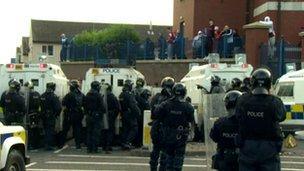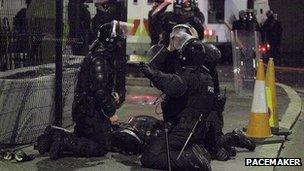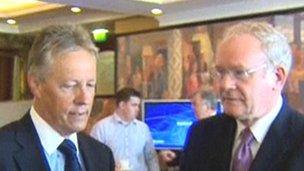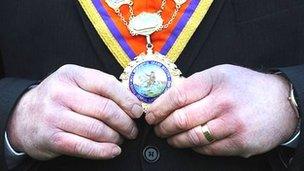Timeline of north Belfast trouble
- Published
Three nights of trouble at a sectarian interface in north Belfast followed growing tensions surrounding a series of contentious parades.
Here is a timeline of recent events.
12 July

Bands defied a ban on playing music while passing St Patrick's Catholic Church
The Protestant Orange Order's marching season culminates on the Twelfth of July, with thousands of parades across Northern Ireland.
Most pass without incident, but some are contentious and the Parades Commission makes determinations on what marches are permissible and what elements should be restricted.
In previous years, there has been an annual protest against Orangemen parading past the nationalist Carrick Hill area, and down Donegall Street in which St Patrick's Catholic Church stands, but no major disturbances.
This year, a loyalist band was filmed marching in a circle outside the church, playing a tune perceived to be sectarian.
The Famine Song, an anti-Catholic song judged racist by a court in Scotland, has the same tune as Sloop John B, a song made famous by the Beach Boys.
The band, the Young Conway Volunteers, said they were entertaining watching supporters while the parade was at a temporary halt and that they had not been aware they were outside a Catholic church.
The Parades Commission described the incident as "totally inappropriate", while Sinn Fein's Conor Maskey said it was "deeply provocative".
DUP MLA and Orange Order member Nelson McCausland said that while the actions of the band were "thoughtless and naive" it did not deliberately set out to offend.
25 August

Disturbances broke out after bands defied the Parades Commission's determination
As part of a determination on a Royal Black Preceptory march on 25 August, the Parades Commission banned the Young Conway Volunteers band from marching past St Patrick's Church.
The 32 other bands taking part were restricted to playing a single drum beat while passing the church.
However, the Young Conway Volunteers and some of the other bands defied the rulings of the Parades Commission.
Disturbances followed and several arrests were made.
Mr McCausland said the actions of loyalist bands in Belfast were "almost inevitable" given the "anger" felt about the Parades Commission.
Loyalists accused the commission of bias and said restrictions on their parades had grown in number and severity.
A number of leading unionists put their names to a letter describing as "monstrous" the Parades Commission's bar on the band.
The leaders of the two main Protestant churches in Northern Ireland criticised the actions of the loyalist bands as "sectarian".
Administrator of St Patrick's Church, Fr Michael Sheehan, said: "There seemed to be a lot of anger and rage that there was so much disrespect shown to our place of worship."
2 September

Police had been keeping loyalist protesters back from a republican parade
Trouble followed a parade by the republican Henry Joy McCracken Flute Band in north Belfast.
Loyalists objected to the Parades Commission not placing restrictions on the march.
The situation escalated in the late afternoon during the return leg of the parade, and 47 police officers were injured during hours of disorder.
Police said the trouble began with loyalists throwing missiles at Carlisle Circus on Sunday afternoon, with others from the republican side getting involved as well.
3 September

Petrol bombs, bricks, fireworks and stones were thrown at police
A second night of rioting - believed to be mainly loyalist - resulted in more than 60 police officers being injured and seven hospitalised.
Petrol bombs, bricks, fireworks and stones were thrown at police, while a van was hijacked and pushed into police lines.
Assistant Chief Constable Will Kerr challenged politicians to sort out the parades issue before someone is killed.
Another loyalist parade is planned for 29 September, marking the 100th anniversary of the signing of the Ulster Covenant. The Orange Order has applied to march along Donegall Street past St Patrick's Catholic Church.
Looking ahead to the parade, ACC Kerr said: "Northern Ireland cannot afford an eleventh-hour solution."
The senior policeman said he did not believe the violence was officially sanctioned by any loyalist paramilitary groups, but he said members of these groups had been involved in the trouble.
"The community of north Belfast needs to see a resolution to this issue now," said ACC Kerr.
"Collectively, we cannot afford to wait and we cannot have night after night of violence on our streets."
4 September
A number of fireworks and other missiles were thrown at police lines during further disturbances.
Police moved in after a crowd of about 200 people gathered in the Denmark Street area at about 22:00 BST.
A police inspector suffered a hand injury during the third night of disturbances, which lasted about an hour.
Earlier that evening, a spokesman for the Methodist Church said it was unacceptable for First Minister Peter Robinson to have kept silent on recent events in north Belfast.
"The people of NI expect leadership from their government to help alleviate tensions and bring peace back to our streets, but the first minister has done nothing except sign an anti-Parades Commission letter which does little to instil confidence on both sides of our, sadly, still-divided community," he said.
5 September

Peter Robinson and Martin McGuinness issued a joint statement after talks about parading
Northern Ireland's first and deputy first ministers, Peter Robinson and Martin McGuinness, described talks about parades as "positive and constructive".
They met north Belfast politicians to discuss the ongoing tensions in the area, while an Orange Order delegation met privately with Mr Robinson.
In a joint statement, the two men said: "We are very encouraged by the determination of all those who attended today's meeting to work together to agree a way forward.
"All agreed that there is no place for violence.
"There is a recognition that all the interested parties, not just politicians, have a role to play in the parades issue."
6 September
The Royal Black Institution apologised "for any offence caused" to clergy and parishioners of St Patrick's Catholic church in Belfast during its parade on 25 August, when loyalist bands played music outside the church in defiance of a ruling by the Parades Commission.
The Institution said its anger was directed at the Parades Commission, not the Catholic church.
Parish priest Fr Sheehan said: "I welcome this positive development and the sincere Christian spirit behind it."
7 September

The Orange Order said it was genuinely committed to finding a "just and equitable resolution to these matters"
The Orange Order announces it is taking part in behind-the-scenes talks to reduce parading tensions ahead of the Ulster Covenant commemorations on 29 September.
It said talks were taking place "to address issues that have arisen in relation to peaceful protests against the Parades Commission".
10 September
The priest at St Patrick's Church, Fr Sheehan, offers to hold talks with the Royal Black Institution so they can meet with members of the church.
He said they have an opportunity to demonstrate with generosity and goodwill that it is possible to reach local agreement.
17 September
The Orange Order said bands taking part in an Ulster Covenant parade will play hymns when passing the Catholic Church where trouble flared.
The decision follows talks with clergy and parishioners of St Patrick's Church and community leaders. However Orangemen refused to speak directly to the Carrickhill Concerned Residents Association.
18 September
North Belfast residents are to meet the Parades Commission later ahead of the Ulster Covenant parade.
Carrick Hill Concerned Residents Association said they would not speak publicly until after the talks.